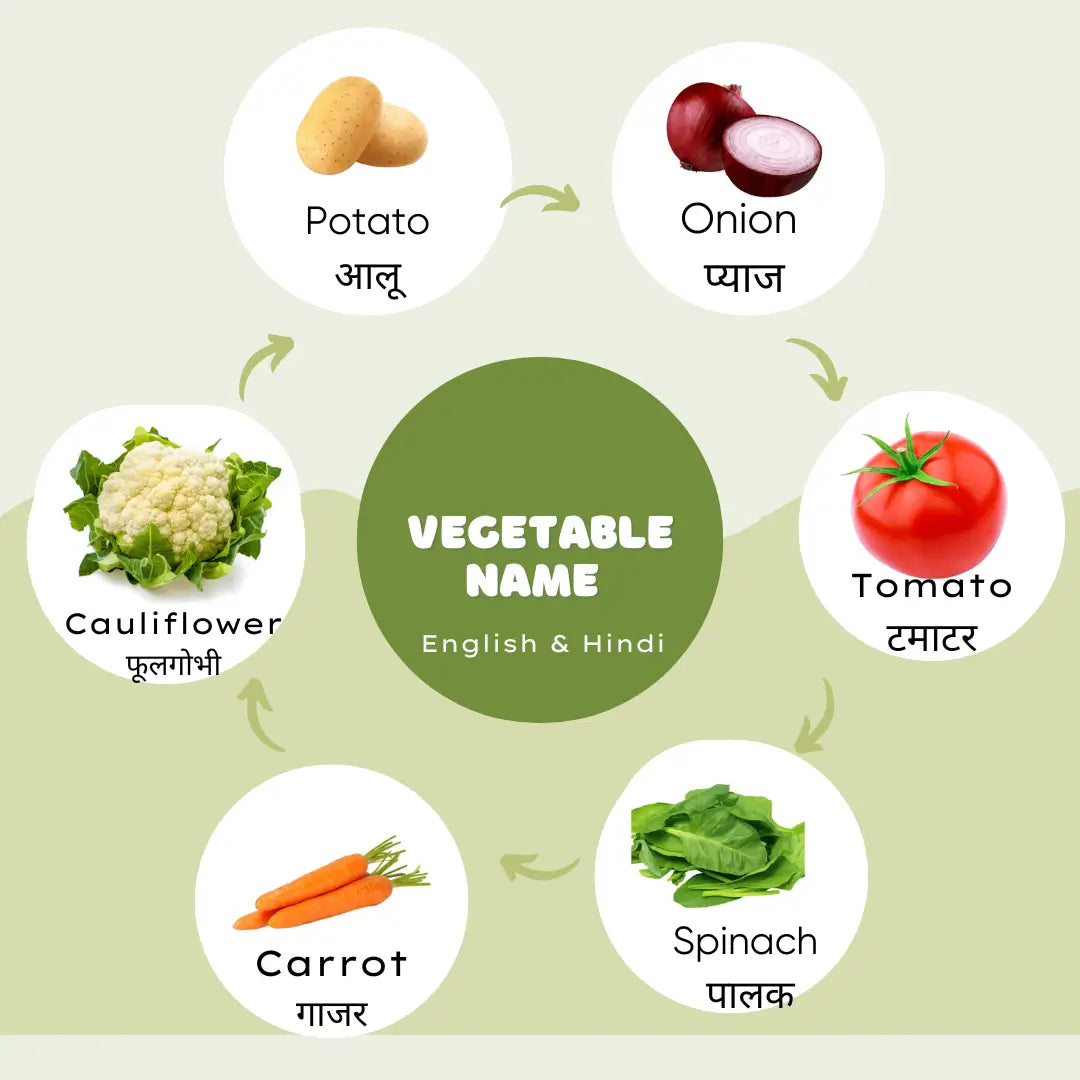List of Vegetable Name For Kids (With Pictures)

Getting kids to eat vegetables can be tough, with many parents hearing “Yuck!” before the greens are served. But teaching kids vegetable name and their benefits can spark curiosity and turn that “Yuck” into “Yum!” Here’s a list of vegetable name, types, and fun ways to make learning exciting for your little ones!
Table of Contents
- What Are Vegetables and Why Are They Important?
- Why Should Young Kids Know About Vegetables?
- English Vegetable Name with Picture
- All Vegetables Name in English
- Lesser-Known Vegetables to Try in India
- Different Types of Vegetables
- Vegetable Names in English and Hindi
- More Info About Some Common Vegetables
- Seasonal Vegetable Name
- Games to Help Children Learn Vegetable Name
- FAQs
What Are Vegetables and Why Are They Important?
Vegetables are edible plants or parts of plants that are rich in nutrients and play a crucial role in maintaining good health. They come in various shapes, sizes, and colours, offering a wide range of vitamins, minerals, and fibre that are essential for growing children.
Key nutrients found in vegetables include:
- Vitamin A for good vision and immune support.
- Vitamin C to boost immunity and aid in skin health.
- Folate for cell growth and metabolism.
- Iron for healthy blood and energy levels.
- Dietary fibre to ensure good digestion and prevent constipation.
Including vegetables in children's meals from a young age helps them develop healthy eating habits, improving their physical and mental development.
Why Should Young Kids Know About Vegetables?
Teaching kids about vegetables has many advantages. Here are a few key benefits:
- Learning vegetable name helps kids expand their vocabulary.
- Knowing about vegetables encourages kids to eat healthy foods.
- Recognizing different vegetables helps them connect with their meals.
- Understanding where vegetables come from teaches kids about food.
- Fun activities with vegetables can make eating them more enjoyable.
English Vegetable Name with Picture

All Vegetables Name in English
Here’s a list of 30 commonly known vegetables:
| Mushroom | Garlic |
| Onion | Drumstick |
| Beetroot | Celery |
| Radish | Elephant Yam |
| Cucumber | Bitter Gourd |
| Lettuce | Lady's Finger |
| Ash Gourd | Ginger |
| Eggplant | Bottle Gourd |
| Bell pepper | Asparagus |
| Cauliflower | Kale |
| Broccoli | Cabbage |
| Spinach | Sweet Corn |
| Potato | Green Beans |
| Tomato | Peas |
| Carrot | Pumpkin |
Lesser-Known Vegetables to Try in India
Here are a few unique and lesser-known vegetable name to know:

- Parwal (Pointed gourd)
- Kantola (Teasel gourd)
- Bathua (Chenopodium leaves)
- Suran (Elephant foot yam)
- Gongura (Roselle leaves)
- Kohlrabi (Knol-khol)
- Tamarillo (Tree tomato)
- Tinda (Indian round gourd)
- Colocasia (Taro)
- Drumstick (Moringa)
Different Types of Vegetables
Vegetables can be categorized based on their growth patterns and edible parts. Common types include leafy greens, root vegetables, and legumes, each offering unique flavors and nutritional benefits. Incorporating a variety of vegetables into your diet not only enhances taste but also supports overall health and well-being.
Leafy Vegetables
Packed with vitamins A, C, and K, along with fiber, leafy greens help boost immunity, improve digestion, and maintain strong bones.

Vegetables name:
- Spinach
- Arugula
- Mustard Greens
- Amaranth
- Cabbage
- Kale
- Drumstick Leaves
- Collard Greens
- Lettuce
- Bok Choy
Root Vegetables
Rich in fiber, vitamins, and minerals, root vegetables are great for energy and digestion, offering a natural source of carbohydrates.

Vegetables name:
- Carrots
- Beets
- Radishes
- Turnips
- Sweet Potatoes
- Potatoes
- Ginger
- Garlic
- Turmeric
- Yam
Stem Vegetables
Low in calories and high in fiber, stem vegetables are great for heart health and weight management.

Vegetables name:
- Asparagus
- Celery
- Bamboo Shoots
- Fennel Stalks
- Leeks
- Rhubarb
- Green Onion
- Kohlrabi
- Water Chestnut
- Broccoli Stem
Flower Vegetables
These are packed with antioxidants and vitamins that support brain health and reduce inflammation.

Vegetables name:
- Broccoli
- Cauliflower
- Artichokes
- Zucchini Flowers
- Bottle Gourd Flowers
- Squash Blossoms
- Drumstick Flowers
- Cabbage Flowers
- Radish Flowers
- Green Pea Flowers
Fruiting Vegetables
High in vitamins C and E, and full of antioxidants, fruiting vegetables help reduce inflammation and improve skin health.

Vegetables name:
- Tomatoes
- Brinjal
- Bell Peppers
- Cucumbers
- Bottle Gourd
- Bitter Gourd
- Ridge Gourd
- Pumpkin
- Ash Gourd
- Snake Gourd
Know your dry fruits name.
Seed Vegetables
Loaded with plant-based protein, fiber, and essential minerals, seed vegetables support muscle growth and healthy digestion.

Vegetables name:
- Peas
- Green Beans
- Chickpeas
- Black Beans
- Soybeans
- Lima Beans
- Kidney Beans
- Mung Beans
- Pigeon Peas
- Lentils
Bulb Vegetables
Bulb vegetables are known for their strong flavors and rich content of antioxidants that boost heart health and improve circulation.

Vegetables name:
- Onions
- Garlic
- Shallots
- Leeks
- Fennel Bulb
- Spring Onions
- Elephant Garlic
- Pearl Onions
- Red Onions
- Green Garlic
Tuber Vegetables
Tuber vegetables are rich in carbohydrates, vitamins B and C, and potassium, making them great for energy and muscle function.

Vegetables name:
- Potatoes
- Sweet Potatoes
- Yams
- Taro
- Cassava
- Jerusalem Artichokes
- Tapioca
- Elephant Foot Yam
- Purple Yam
- Water Chestnut
Legumes
Legumes are nutrient-dense with fiber, protein, and folate, supporting healthy blood sugar levels and muscle growth.

Vegetables name:
- Green Peas
- Chickpeas
- Lentils
- Black Beans
- Rajma/Kidney Beans
- Mung Beans
- Toor Dal
- Bengal Gram
- Soybeans
- Lima Beans
Sea Vegetables
Rich in iodine, calcium, and iron, sea vegetables are excellent for thyroid function and maintaining healthy bones and skin.

Vegetables name:
- Seaweed (Kombu)
- Nori (used in sushi)
- Dulse
- Wakame
- Irish Moss
- Kelp
- Various types of edible algae
Vegetable Names in English and Hindi
|
Vegetable Names in English |
Vegetable Names in Hindi |
| Ginger | अदरक (Adrak) |
| Potato | आलू (Aloo) |
| Onion | प्याज़ (Pyaaz) |
| Tomato | टमाटर (Tamatar) |
| Spinach | पालक (Palak) |
| Carrot | गाजर (Gajar) |
| Cauliflower | फूलगोभी (Phoolgobhi) |
| Cabbage | पत्ता गोभी (Patta Gobhi) |
| Brinjal | बैंगन (Baingan) |
| Garlic | लहसुन (Lahsun) |
For more vegetable names in English and Hindi, check here.
More Info About Some Common Vegetables
|
Vegetables Name
|
About it |

|
Beans are a diverse group of legumes that are high in protein and fiber. They come in various types, such as kidney beans, black beans, and pinto beans, making them a versatile ingredient in many dishes. |
 |
Pumpkin is a nutrient-dense vegetable that is rich in vitamins A and C, fiber, and antioxidants. It is often used in soups, pies, and as a roasted side dish, especially in the fall. |
 |
Garlic is a bulbous plant known for its strong flavor and aroma. It is rich in allicin, which has antibacterial and antifungal properties and may help reduce blood pressure. |
 |
Carrots are orange-colored root vegetables that are known for their high vitamin A content, which is beneficial for eye health. They can be eaten raw, cooked, or juiced and are a staple in many cuisines. |
 |
Brussels sprouts are small, green, edible buds that resemble mini cabbages. They are packed with vitamins C and K, fiber, and antioxidants, and are often roasted or steamed for a flavorful side dish. |
 |
Spinach is a leafy green vegetable that is rich in iron, vitamins A, C, and K, and antioxidants. It can be eaten raw in salads or cooked in various dishes, adding a nutritious boost to meals. |
 |
Beetroot is a vibrant red root vegetable that is high in folate, manganese, and dietary nitrates. It can be roasted, pickled, or juiced and is known for its potential to improve blood flow and lower blood pressure. |
 |
Radishes are crunchy, peppery root vegetables that come in various colors, including red, white, and black. They are low in calories and a good source of vitamin C, often enjoyed in salads or as a crunchy snack. |
 |
Brinjal, or eggplant, is a purple-skinned vegetable that is high in fiber and antioxidants. It has a unique texture and flavor, making it a popular ingredient in curries, stir-fries, and grilled dishes. |
 |
Sweet potatoes are starchy root vegetables that are rich in vitamins A and C, fiber, and antioxidants. They can be roasted, mashed, or used in desserts, and are known for their naturally sweet flavor. |
To learn about fruits name, click here.
Seasonal Vegetable Name
Winter (December to February)
During winter, cooler temperatures create ideal growing conditions for a variety of nutritious vegetables.
Examples:
- Carrots (Gajar)
- Cauliflower (Phool Gobhi)
- Cabbage (Patta Gobhi)
- Spinach (Palak)
- Radish (Mooli)
- Green Peas (Matar)
- Mustard Greens (Sarson)
- Turnip (Shalgam)
- Beetroot (Chukandar)
- Fenugreek (Methi)
Summer (March to June)
Summer vegetables are often characterized by their ability to withstand heat and are typically light and refreshing.
Examples:
- Cucumber (Kheera)
- Bottle Gourd (Lauki)
- Pumpkin (Kaddu)
- Bitter Gourd (Karela)
- Okra (Bhindi)
- Eggplant (Baingan)
- Tomatoes (Tamatar)
- Bell Peppers (Shimla Mirch)
- Green Beans (French Beans)
- Chilies (Mirch)
Monsoon (June to September)
The monsoon season brings a variety of vegetables that thrive in the rainy conditions, many of which have a high water content.
Examples:
- Brinjal (Baingan)
- Colocasia (Arbi)
- Yam (Jimikand)
- Taro Root (Arbi)
- Pumpkin (Kaddu)
- Bitter Gourd (Karela)
- Cucumbers (Kheera)
- Green Peas (Matar)
- Snake Gourd (Chur Chur)
- Drumsticks (Sahjan)
Autumn (October to November)
Autumn marks the transition to winter and is a time when a variety of crops are harvested, particularly after the monsoon.
Examples:
- Spinach (Palak)
- Cauliflower (Phool Gobhi)
- Carrots (Gajar)
- Radish (Mooli)
- Peas (Matar)
- Turnips (Shalgam)
- Beets (Chukandar)
- Mustard Greens (Sarson)
- Cabbage (Patta Gobhi)
- Fenugreek (Methi)
Games to Help Children Learn Vegetable Name
Here are a few engaging games that will make learning vegetable name fun for kids:
-
Vegetable Flashcards
Create simple flashcards with pictures of vegetables like carrots, tomatoes, and broccoli. Show them to the kids and ask them the vegetable name. This helps with visual recognition and memory. -
What’s In My Plate
Serve your child different vegetables during meals and ask them to guess what they are eating. This hands-on game encourages learning through tasting and seeing. -
Vegetable Painting
Use vegetables like potatoes, carrots, or ladyfingers to stamp patterns onto paper using paint. While painting, you can teach your child the vegetable name they’re using. -
Memory Matching Game
Make pairs of cards with pictures of vegetables. The child flips over two cards at a time, trying to match them. This game helps improve memory and recognition of vegetable name. Here is an example video. -
Guess the Vegetable name
Blindfold your child and let them touch different vegetables. They can guess each vegetable by its texture and shape, which makes learning sensory and fun. -
Veggie Hunt
Hide plastic vegetable toys around the house and let your child go on a treasure hunt to find them. Every time they find one, they must name the vegetable. This game adds an element of excitement to learning.
Every little bite counts! Remember, introducing new vegetables is a journey. Celebrate your child’s curiosity and willingness to try—after all, today’s ‘yuck’ might just become tomorrow’s ‘yum’!
FAQ'S
1. What is the national vegetable of India?
The national vegetable of India is the Pumpkin (Kaddu), which is widely used in various regional cuisines across the country.
2. What is the king of vegetables?
The king of vegetables is the Brinjal (Baingan), especially in India, where it is a staple ingredient in many dishes like Baingan Bharta and Sambar.
3. How to Incorporate More Vegetables into Your Diet?
To incorporate more vegetables into your diet, try adding them to smoothies, soups, salads, and sandwiches. You can also sneak them into pasta sauces, make veggie-packed omelets, or prepare traditional dishes like mixed vegetable curry and dal that include a variety of vegetables.
4. What are the 20 types of vegetables?
Carrot, Potato, Spinach, Tomato, Broccoli, Cauliflower, Bell Pepper, Zucchini, Eggplant, Cucumber, Pumpkin, Peas, Green Beans, Sweet Corn, Cabbage, Kale, Okra, Radish, Lettuce, Beetroot.
5. What are the top 20 vegetables to eat?
Spinach, Kale, Carrots, Beets, Broccoli, Cauliflower, Tomatoes, Sweet potatoes, Bell Peppers, Drumsticks, Bitter Gourd, Beans, Lady’s Finger, Eggplant, Zucchini, Green Peas, Arugula, Pumpkin, Garlic, Radish.
































